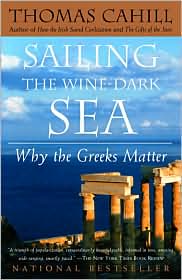
Thomas Cahil, Sailing the Wine Dark Sea - Why the Greeks Matter, Audio book narrated by John Lee, Books on Tape 2003. Also available in hardback and paperback.
I just finished another installment of Thomas Cahil's Hinges of History series of books chronicaling the sources and influences of western culture. As with the Mysterious Middle Ages, I thouroughly enjoyed Cahil's work Sailing the Wine Dark Sea. Any student of the classical sources would find great enjoyment in Cahil's work; though it must be said that these works are not intending to trod new ground. What I have most enjoyed is that Cahil seems to be achieving his goals with these works. Rather than simply recount literature and ideas his goal has been to make the people of history speak to us once again; in this volume I heard the echoes of the ancients who ruled the Mediterranean and beyond.
In this review I want to highlight some things I enjoyed from the work and then comment briefly on a few glaring drawbacks to this work. I want to note that I read Cahil more as one interested in the history of ideas and cultures rather than a critique of his work as a classicist. I will leave that to others who share that field. On to the some highlights.
Highlights
Any history of ancient times, people and places has the great risk to be profoundly boring and the opportunity to launch a new adventure for the mind of the reader. Cahil's treatment of the Greeks was certainly the latter. His discussion of the epic stories of the Illiad and the Odessey brought renewed fascination for me of wars in Troy and wanderings with gods and men. For those unfamiliar with these epic poems Cahil will be a great introduction. Additionally at every phase of the work, whether art, politics, science. medicine or philosophy Cahil traces developments historically. This adds a great bit of perspective to the work which I highly appreciated.
The book begins with the two great poems of Homer and structures two chapters treating these works. The Iliad Cahil treats the great warrior culture that emerged from Greece and indeed has populated much of western thought and politics ever sense. Second the romance and longing for home is treated by looking at the plight of Odysseus. As mentioned before, if anything these chapters introduce these poems to a new generation. Yet they also bring some reflection on the western war machine and the desire for love, peace and home. Always relevant in a world of depravity where conflict and love both clamor for the soul.
Perhaps the most enjoyable part of work for me was the treatment of philosophy. Comprised of two Greek words phileo (love) and sophia (wisdom), western philosophical reflection found deep percolation in the minds of the Greeks. Cahil's treatment is brief but thoroughly traces thought through the pre-Socratics, to the looming figure of Plato's Socrates, the ideas of Plato himself and his greatest student Aristotle who would one day be known in medieval Europe merely as "the philosopher." A friend once said to me "philosophy is flashy, but theology nourishes the soul" - I confess this to be true. The wrestling of the Greeks with the nature of everything is a contagious pursuit in the West. I too find the art of questioning to be a pleasurable pursuit. Yet when philosophy does not meet its proper object - reflection can only go awry. Thinking and meditation with God and after God is fruitful indeed. Speculation and pondering as aimless wandering apes has lead only to postmodern uncertainty and deplorable despair. Yet anyone who wants to reason well can learn much from our Greek friends. In fact, I did some small work tonight with my six year old which was first formalized by Aristotle. Indeed, the Greeks matter. (For those interested we discussed these laws: A is, A=A, A or nonA=True, A and nonA=False)
Lowlights
Cahil's book also had some shocking weaknesses which almost ruined the book for me. One chapter is subtitled "How to Party" - indeed a lesson we learn from the Greeks but one presented by Cahil in brash and at times lewd form. In treating the proclivities of the Greeks it is expected that wine, sexuality and song should be a part of the story, but how that story is told can bring unfortunate baseness. Cahil chooses some profane language to interact with the Greeks, dropping the f-bomb on several occasions. In one instance he was perhaps attempting to be true to the translating a poem by using the meaning of the modern f-word, yet at times it appeared almost as if he wanted to shock sensibilities. Certainly the Greek attitude about sex would on its face offend many today. Yet in whatever the case, the language was offensive and in my opinion highly unnecessary. Additionally the treatment of pederasty occupied too much space and was presented as a cultural norm without any harsh criticism from Cahil. The discussion of the sexual escapades and drunken debauchery may be too much for some who take up this book. Readers be strongly warned - this was a major drawback for me.
Conclusion
In reading Sailing the Wine Dark Sea I again was taken deep into the heart of a people which lay in the past of western culture. I learned much, enjoyed Cahil's historical writing and engaging prose and heard again why I am glad the Christ overcame both Dionysus and Apollo. I look forward to reading the rest of the series on road trips in the car...perhaps next will be The Gift of the Jews.

